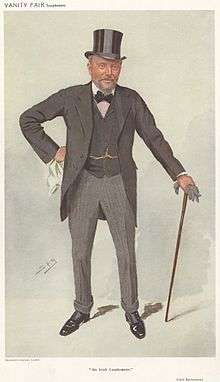Arthur Smith-Barry, 1st Baron Barrymore

Lord Barrymore as caricatured by Spy (Leslie Ward) in Vanity Fair, August 1910
Arthur Hugh Smith-Barry, 1st Baron Barrymore, PC (17 January 1843 – 22 February 1925), was an Anglo-Irish Conservative politician.
Background and education
Smith-Barry was the son of James Hugh Smith Barry, of Marbury, Cheshire, and Fota Island, County Cork, and his wife Eliza, daughter of Shallcross Jacson. His paternal grandfather John Smith Barry was the illegitimate son of James Hugh Smith Barry, son of the Hon. John Smith Barry, younger son of Lieutenant-General The 4th Earl of Barrymore (a title which had become extinct in 1823; see Earl of Barrymore). He was educated at Eton and Christ Church, Oxford.
Political career
Smith-Barry entered Parliament as one of two representatives for County Cork in 1867, a seat he held until 1874. Smith-Barry remained out of the House of Commons for the next twelve years but returned in 1886 when he was elected for Huntingdon, and represented this constituency until 1900. He was also High Sheriff of County Cork in 1886 and was tasked by Arthur Balfour to organise landlord resistance to the tenant Plan of Campaign movement of the late 1880s. He was sworn of the Irish Privy Council in 1896. In 1902 the Barrymore title held by his ancestors was partially revived when he was raised to the peerage as Baron Barrymore, of Barrymore in the County of Cork.[1]
Cricket
Smith-Barry played two first-class cricket matches for the Marylebone Cricket Club, playing once in 1873 and once in 1875.[2]
Family
Lord Barrymore married firstly Lady Mary Frances, daughter of The 3rd Earl of Dunraven and Mount-Earl, in 1868. After her death in 1884 he married secondly Elizabeth, daughter of U.S. General James Wadsworth and widow of Arthur Post, in 1889. There were children from both marriages. Lord Barrymore died in London in February 1925, aged 82, and was cremated at Golders Green Crematorium.[3] His only son James had died as an infant in 1871 and consequently the barony became extinct on Barrymore's death. The Irish family seat of Fota House was passed on to his daughter from his second marriage, the Hon. Dorothy Elizabeth (1894–1975), wife of Major William Bertram Bell. Lady Barrymore died in May 1930.
On the death of Arthur Hugh Smith Barry in 1925, the estate, which was entailed, passed to his brother James Hugh Smith Barry and on his death it passed to James Hugh's son Robert Raymond Smith Barry. In 1939 the estate of Fota Island and the ground rents of areas was acquired by Arthur Hugh's daughter, The Hon. Mrs. Dorothy Bell for the sum of £31,000. On her death, in 1975, it passed to her daughter Mrs. Rosemary Villiers and Fota House is now the property of The Irish Heritage Trust.
See also
References
- ↑ The London Gazette: no. 27457. p. 4739. 25 July 1902.
- ↑ "Player profile: Arthur Smith-Barry". CricketArchive. Retrieved 10 July 2014.
- ↑ The Complete Peerage, Volume XIII - Peerage Creations 1901-1938. St Catherine's Press. 1949. p. 16.
External links
- Hansard 1803–2005: contributions in Parliament by Arthur Smith-Barry
| Parliament of the United Kingdom | ||
|---|---|---|
| Preceded by Nicholas Philpot Leader George Richard Barry |
Member of Parliament for County Cork 1867–1874 With: Nicholas Philpot Leader 1867–1868 McCarthy Downing 1868–1874 |
Succeeded by McCarthy Downing William Shaw |
| Preceded by Thomas Coote |
Member of Parliament for Huntingdon 1886–1900 |
Succeeded by George Montagu |
| Party political offices | ||
| Preceded by Marquess of Granby |
Chairman of the National Union of Conservative and Constitutional Associations 1897 |
Succeeded by Sir Benjamin Stone |
| Peerage of the United Kingdom | ||
| New creation | Baron Barrymore 1902–1925 |
Extinct |